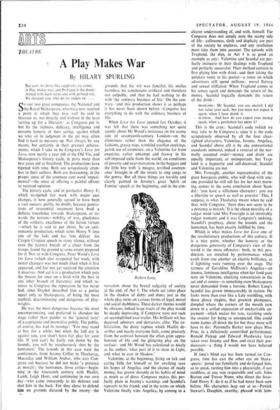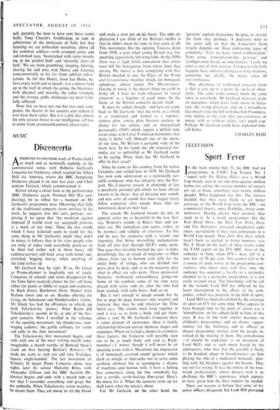A Play Makes War
&En
THEATRE
By HILARY SPURLING
But now, no more like suppliants we come; A Play makes war, and Prologue is the drum: Armed with keen satire and with pointed wit, We threaten you, who do for judges sit. . . .
So our two great companies, the National and the Royal Shakespeare, who have now reached a point at which they may well be said to threaten us, not directly and without in the least `setting up for a Dictator,' as Congreve put it, but by the richness, delicacy, intelligence and extreme honesty of their acting; against which we who sit in judgment in the pit may often find it hard to measure up. Not always, by any means, but certainly in their greatest achieve- ments, which I take to be Congreve's Love for Love, now nearly a year old at the Old Vic, and Shakespeare's history cycle, in parts mote than two years old at Stratford. The productions have ripened with time. Both are scrupulously atten- tive to their authors. Both are threatening, in the proper sense of the common cant word 'experi- mental'—the sense of offering a painful affront to received opinion.
The history cycle, and in particular Henry V, which re-opened last week with major cast changes, is now generally agreed to have been a vast success; partly, no doubt, because genera- tions of reverential treatment have bred a definite truculence towards Shakespeare, or to- wards the notions—nobility of war, pluckiness of the soldiery, excellence of the heroic virtues —which he is said to put about. So an anti- romantic production, which turns Henry V into one of the lads and has him deliver his Crispin Crispian speech in stony silence, without even the faintest breath of a cheer from the troops, found the ground to some extent prepared for it. Not so with Congreve. Peter Wood's Love for Love (which also re-opened last week, with minor changes) was not much liked when it first appeared, and has not yet received the attention it deserves. And yet it is a production which puts the theatre for once on a level with the best in any other branch of literature; and which re- stores to Congreve the reputation he has never had, since Dryden described him as a genius equal only to Shakespeare, of being the most truthful, discriminating and dangerous of play- wrights.
He was the most dangerous because the most uncompromising, and preferred to abandon the stage rather than pander to the 'general taste' of a capricious and insensitive public. The public, of course, has had its revenge: 'You may stand at bay for a while; but when the full cry is against you, you shan't have fair play for your life. If you can't be fairly run down by the hounds, you will be treacherously shot by the huntsmen.' The hounds in this case were the conformists, from Jeremy Collier to Thackeray, Macaulay and William Archer, who cast Con- greve out because he did not make 'a pretence at morals'; the huntsmen, those critics—begin- ning in the nineteenth century with Hazlitt, Lamb, Leigh Hunt, and continuing in our own day—who came innocently to his defence and shot him in the back. For they chose to defend him on grounds dictated by the enemy—the grounds that his wit was fanciful, his malice harmless, his conclusions artificial and therefore not culpable, and that he had nothing to do with 'the ordinary business of life.' On the con- trary—and this production shows it as perhaps it has never been shown before—Congreve has everything to do with the ordinary business of life.
When Love for Love opened last October, it was felt that there was something not quite seemly about Mr Wood's insistence on the seamy side of seventeenth-century London—on the clumsiness rather than the elegance of the fashions, greasy wigs, wrinkled woollen' tockings, garish use of cosmetics; on a Valentine far from exquisite, rather unkempt and frowsy in his self-imposed exile from the world; on conditions of poverty and near-starvation, in the beggars and the little boy With 'a meagre, terrified counten- ance' brought in off the streets to sing songs to the gentry. But all these things are harshly and clearly painted in Jeremy's great 'Spirit of Famine' speech at the beginning, and in the con- Robert Lang versation about the brutal vulgarity of society at the end, of Act 1. The whole act takes place in the shadow of debts and duns; just as the whole play turns on various forms of legal, moral and social shabbiness. These darker themes would be obvious, indeed large tracts of the play would be deeply depressing, if Congreve were not such an accomplished coat-trailer. His brilliant wit has deceived admirers and detractors alike. The ex- hilaration, the dizzy rapture which Hazlitt de- scribes and nearly everyone feels, come precisely from the contrast between the often grim appre- hension of life and the glittgring play on the surface: and Mr Wood has calculated as nicely as his author, 'what part of it to show in Light, and what to cast in Shadow.'
Valentine, at the beginning, living on tick and caring little for himself or for anything save his hopes of Angelica and the chance of ready money, has grown slovenly in his habits of mind as much as of dress. Congreve makes this per- fectly plain in Jeremy's warnings and Scandal's reproofs to his friend; and in the terms on which Valentine finally wins Angelica, by coming to a
clearer understanding of, and with, himself. For Congreve does not simply note the seamy side of life: callousness, sloth and duplicity are part of the society he explores, and any resolution must take them into account. The episode with Trapland, the dun, in Act 1 is as good an example as any : Valentine and Scandal are per- fectly insincere in their dealings with Trapland and perfectly successful. Their method consists in first plying him with drink, and then taking the quickest route to his pocket—a route on which advertisers still spend millions: moral flattery and sexual titillation. When Trapland comes to his senses again and demands the return of the money, Scandal logically demands the return of the drink : TRAPLAND : Mr Scandal, you are uncivil; I did not value your sack; but you must not expect it again, when I have drunk it.
. SCANDAL: And how do you expect your money again, when a gentleman has spent it?
This is the crux: Scandal's code (which we may take to be Congreve's, since it is the code scrupulously observed by all the four clear- sighted characters, Valentine, Jeremy, Angelica, and Scandal above all) is by any conventional standards immoral, indeed a reversal of the nor- mally accepted order—money and drink are equally important, or unimportant; but Trap- land is a hypocrite and self-deceived; Scandal and Valentine are not.
Mrs Foresight, another representative of the great bourgeois public, who will sleep with any- one provided he will tell lies for her 'next morn- ing, comes to the same conclusion about Scan- dal: 'you have a villainous character: you are a libertine in speech as well as practice.' This, I suppose, is what Thackeray meant when he said that, with Congreve, 'there does not seem to be a pretence at morals.' It is the cheap morality of a vulgar mind (and Mrs Foresight is an inimitably vulgar woman); and it was Congreve's undoing. Scandal's prophesy, about the hounds and the huntsmen, has been exactly fulfilled by time.
Which is what makes Love for Love one of the revolutionary productions of this century. It is a nice point, whether the honesty or the dangerous generosity of Congreve's view of the world is the more offensive: both, in this pro- duction, are matched by performances which catch from one another an electric brilliance, as if lightning were running over the stage. The tartness of Geraldine McEwan's Angelica—an intense, luminous intelligence when her fond gaze rests on Valentine, checking romanticism in the act and at source—is something even Shakespeare never demanded from a heroine. Robert Lang's Scandal has grown immeasurably in stature. He looks more than ever like a Lely worldling, with those glossy ringlets, that greenish plumpness, dimpled where the corners of the mouth turn down in a settled expression of uncharitable en- joyment—which makes his rare, ravishing smile the sweeter for being so unexpected. One could name names all down the list but three more will have to do: Petronella Barker now plays Miss Prue, in a deliciously countrified performance; Ronald Pickup and Edward Hardwicke have taken over Jeremy and Ben, and rival their pre- decessors—a thing I would not have believed possible.
If time's blind eye has been turned on Con- greve, time has cast the other eye on Shake- speare: pored too familiarly and de-fanged him, so, to speak, turning him into a playwright, if not toothless, at any rate respectable and safe. John Barton and Trevor Nunn, who direct the Strat- ford Henry V, do it as if he had never been seen before.. His characters leap out at us—Patrick Stewart's Dauphin, swarthy, pleased with him-
self, patently the man to have sent those tennis balls; Tony Church's Archbishop, so rapt in admiration of the intricacies of Salic law that listening we are enthralled ourselves; above all the common soldiers—with cramped joints and red-rimmed eyes, 'besmirched with rainy march- ing in the painful field' and 'shrewdly short of beef.' We see them grumbling, sleeping, fighting, sharing the odd joke with Henry and listening noncommittally to his far from jubilant exhor- tations. As for this Henry, from Ian Holm, be- lieve every word you've heard: it is a mirror held up to the wall in which the grime, the bleakness, both physical and morally, the sober triumphs and the strange, giddy intimacies are most faith- fully reflected.
Now that we have not one but two such com- panies, the theatre in this country can seldom if ever have been richer. But it is a pity that almost the only serious threat to our intelligence still has to come from seventeenth-century playw rights.































 Previous page
Previous page